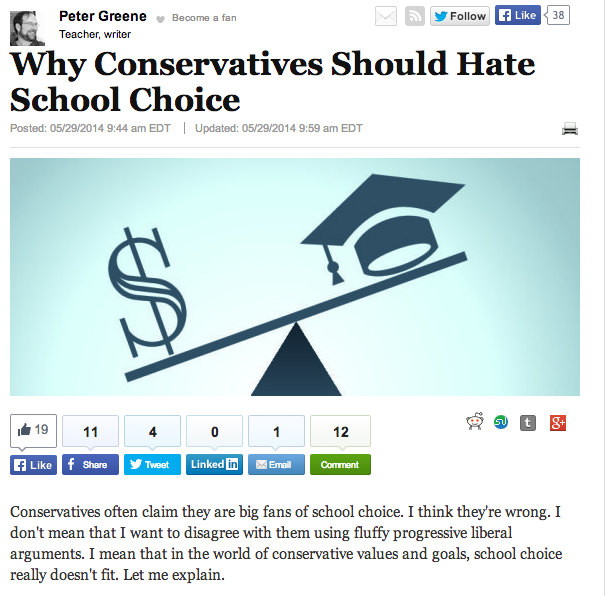Friday Freakout: Should Conservatives Support School Choice?
There are many ways to argue a point. The best method is to make your claim with well-reasoned logic and compelling evidence. This is not the method teacher/blogger Peter Greene used in his recent Huffington Post piece “Why Conservatives Should Hate School Choice.” Instead, he attempts to use a “Jedi Mind Trick.” He waves his hand at the evidence and claims, “School choice is not the system you are looking for.” This falls flat because, try as he might, a Jedi Peter Greene is not.

I could start by questioning whether Greene actually knows what conservatives want or value, but I won’t. Let’s assume he knows conservatives. Do his claims hold any merit?
Claim 1: School choice is less efficient than the current system.
Greene writes:
“One of the assumptions of every choice system is that a choice system can operate for the same amount of money – or less – than the current system. This is clearly false.”
When you examine the evidence it is clear that cost savings are almost universally realized through school choice programs.
A recent study by the School Choice Demonstration Project at the University of Arkansas found that the “average public charter school student in the U.S. is receiving $3,814 less in funding than the average traditional public school student.” Despite that fact, public charter schools perform just as wellas, if not better, than their traditional public school counterparts. This isn’t rocket science: less funding + equal (or better) outcomes = cost savings and improved efficiency.
The same can be said for private school choice programs. In a comprehensive study for the Friedman Foundation, Greg Forster reviewed the empirical literature on the fiscal effects of private school choice programs. All six studies on the subject found significant savings for taxpayers. In Washington, D.C., for example, it is estimated the Opportunity Scholarship Program saved taxpayers $135 million.
Of course, school choice programs were specifically designed to provide cost-savings. It is possible the savings could disappear over time as choice programs grow in popularity and become more generous. This is not new to publicly financed education systems. Traditional public schools have faced growing costs for decades. Over the past 40 years, inflation-adjusted education spending has increased by more than 180 percent. During that time, the traditional system has offered no hope of reigning in costs; school choice has. They are called education savings accounts (ESAs).
ESAs allow individuals to direct their education dollars to one or multiple schools and service providers. Unspent money remains in the account for parents to use on a host of educational expenses or to be saved for higher education purposes. That ability to save money from year to year puts a downward pressure on prices because it empowers parents to shop cost-consciously and it encourages schools to keep prices competitively low.
Ultimately, most would agree that if we must spend more money to educate children, that money would be well spent as long as children are learning. The system in which that spending increases is the difference. One must choose: a system where all families have the option to select their child’s educational setting or a system where only affluent families are allowed to make a school choice that defies district orders? I, and the Friedman Foundation, would rather spend money in a system that empowers all families first.
Claim 2: School choice will lead to big government.
In Greene’s opinion, it is inevitable that school choice will lead to greater government oversight. On this, Greene does have a point. As a new study by Andrew Catt of the Friedman Foundation points out, private school choice programs have led to increased regulations on private schools. Importantly, Catt finds that the design of the program matters.
Regulations tend to increase less in tax-credit scholarship programs than they do in voucher programs. Arizona’s ESA program was the only private school choice program that did not lead to increased burdensome regulation. Given these findings, there is hope that well-designed systems can help limit government intrusion in private schools.
With that said, Greene misses one of the most critical aspects of “big government” – compulsion. In the traditional system, parents are compelled to send their children to the local government-operated public school (if they can’t afford alternatives, and most can’t) and the school is compelled to comply with government regulations. School choice helps to break individuals free from that compulsion.
Private schools are free to choose to participate in the program and parents are free to choose the school that meets their child’s needs. They are not compelled to send them to a nearby school regardless of quality.
Claim 3: Competition does not foster quality products.
In his post, Greene suggests school choice will not lead to good schools. Rather, it will lead to schools that are fun and cool, such as “No Homework High.” This is insulting to the many parents who so desperately want a better education for their children.
We now have more than 6,000 charter schools in 42 states and the District of Columbia, which serve more than 2 million children. The most popular schools, the ones with waiting lists to get in, tend to be the schools with the best academic records and most rigorous curriculum. They are the schools that are putting students on the path to college.
School choice absolutely fosters quality. More important, it allows parents to determine what quality looks like to them. As James Kelly and Benjamin Scafidi note in their Friedman Foundation paper, “More than Scores,” private school choice parents consider a host of factors when choosing their children’s schools.
Claim 4: Competition will lead to centralized control.
Greene argues that conservatives should oppose school choice because it will lead to choice and competition, and you know what that means: “Unbridled competition leads to centralized control.” As examples, he points to Rockefeller, Carnegie, and Pearson, the education testing company.
The system he describes is not unbridled competition. It is a system of government intervention and corporate cronyism, which he even recognizes: “…[T]hey did not conquer their world simply by being so much better than everyone else. They use money and influence and, when necessary, the tool of Big Government to get their way.”
Milton Friedman spoke about this very issue. He argued there is a difference between being pro-free enterprise and pro-business. Businesses act in their own self-interest and support regulations that stifle their competition. That does not mean the free-enterprise system doesn’t work. It means that we must fight against government intervention in the free market.
Similarly, being pro-school choice is not the same as being pro-big education conglomerates. It is possible that education groups could grow unwieldy in a school choice marketplace, but you must ask yourself: Which is more likely to lead to centralized control, choice and competition or centralized government control? The large education providers, testing companies, and curriculum developers of today are not products of school choice. Rather, they grew so large, in part, because of the many federal regulations, including the Common Core State Standards, and the largely one-choice system we have in place today, which can be easily leveraged.
Conclusion
Peter Greene does not offer compelling logic or facts for why he believes conservatives should hate school choice. He simply waives his hand at the evidence.
Furthermore, he assumes conservatives are concerned only with what school choice will cost and what school choice will do to markets. Does the descriptor “conservative” now mean robot? Is he saying conservatives can’t care about helping more children, including our own, to access education that fits their needs and helps them thrive? As a conservative myself, I am offended by the implication. There are lots of practical reasons conservatives and liberals alike support school choice. The most important one? It helps kids who are struggling now to get the help they need now.
That’s just good policy.
A few days later, Peter Greene posted a fifth reason he thinks conservatives should hate school choice on The Huffington Post. Check out my response to that claim here.




